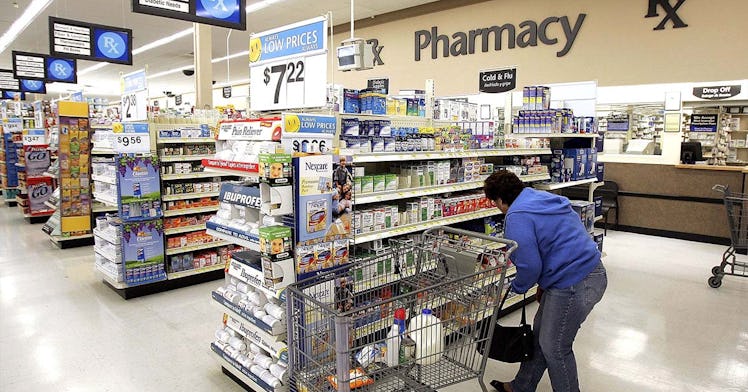Walmart’s Low Cost Insulin Shows Pharmaceutical Price Gouging is Real
The nation's largest retailer is diving into diabetic care. They're not alone.

Walmart, the online and brick-and-mortar retail behemoth, is a go-to place for groceries, last-minute plastic pool purchases, and cheap clothing deals for many families. But now, the retailer and largest private U.S. employer will offer life-saving medicine at a severely reduced cost.
Adults and children will be able to buy private-label ReliOn NovoLog insulin injections with a prescription from Walmart pharmacies as early as this week and in July, Sam’s Club pharmacies will carry the injection. Novolog, the injection, is part of Walmart’s growing ReliOn line of diabetic care products.
The starting price for this private-company insulin injection will cost consumers roughly $73 for a vial and just under $90 for a package of prefilled injection pens.
Walmart’s exclusive injection will cost consumers anywhere from 8 to 75 percent less than similar insulin brands, according to Walmart’s savings calculations for out-of-pocket costs.
Insulin prices have a long history of sticker-shock, which has spurred consumer pushback against the pharmaceutical industries responsible as well as congressional hearings aimed at pharma executives to reel in the rising prices.
Americans continue to pay exorbitant insulin prices compared to other countries across the globe. A 2020 study from the nonprofit research group RAND Corporation found that U.S. insulin costs patients anywhere from 3.8 times higher (Chile) to 27.7 times higher (Turkey) than in other countries.
Numerous diabetics or families of now-deceased diabetics have having to ration insulin, because of their inability to pay for monthly prescriptions. Insulin rationing is extremely dangerous.
One in four diabetic patients have reported skipping insulin treatments because of the high cost of the drug. The ADA cites diabetic care costs roughly $16,000 a year. The National Institute of Diabetes and Digestive and Kidney Diseases offers a variety of online resources to help pay for diabetic management, but the reality is that as long as the costs of insulin are as exorbitant as they are, Americans will die of the disease.
While Americans shell out large sums of cash to fight off diabetic comas, three private United States pharmaceutical companies—Eli Lilly, Sanofi and Novo Nordisk—rake in billions of dollars in profit each year and expect more growth heading into 2031.
The majority of Americans with diabetes are prescribed newer versions of insulin, which have sky-rocketed in price since 2012 with a year-over-year increase of roughly 15 percent. A 2016 study published in the peer-reviewed Journal of the American Medical Association found that from 2002-2013 the average price of insulin tripled, from $4.34 per milliliter to $12.92 per milliliter.
Roughly 35 million Americans have type-1 or -2 diabetes and a third of those people require insulin to manage the disease. Most type-1 diabetics are children or young adults and the average type-2 diabetes onset age is 45, according to the American Diabetes Association. The Center for Disease Control and Prevention’s 2020 National Diabetes Statistics Report finds that Black adults had the highest percentage (16 percent) of both diagnosed and undiagnosed diabetes from 2003 to 2016.
The launch of a Walmart-exclusive insulin and diabetic products points to a growing trend of big-box stores joining the race to the bottom for health care coverage and care.
Amazon, the second-largest private U.S. employer, is stepping into the employer-health care market this year with their on-demand healthcare service Amazon Care. The company — that has routinely come under fire for COVID-19 outbreaks and workplace conditions —plans to offer telehealth services for Amazon Care users.
While Walmart’s working conditions are just as grueling for its 1.5 million workers, the launch of cheap insulin alongside their expansion of cheap clinics, generic prescriptions and other family needs is a step in an affordable direction for thousands of families who have to make a decision between paying for groceries or life-dependent hormones and care equipment.
This article was originally published on